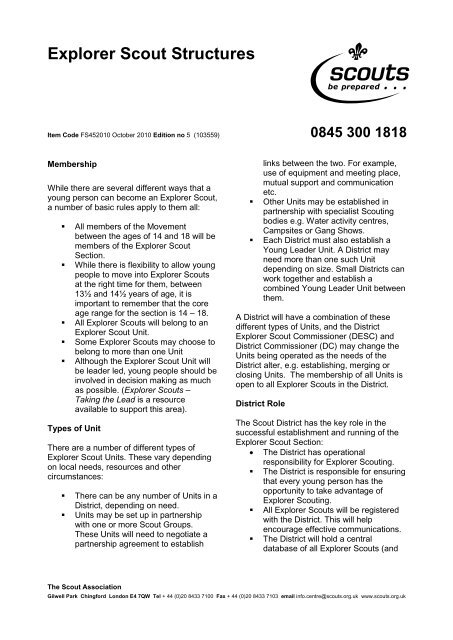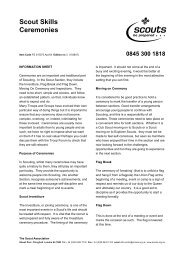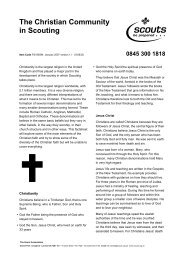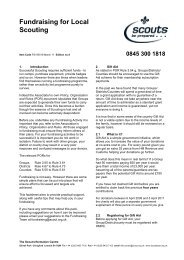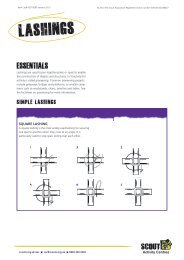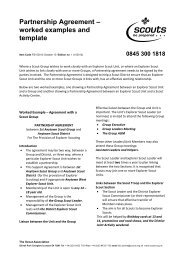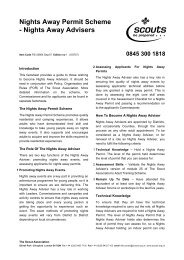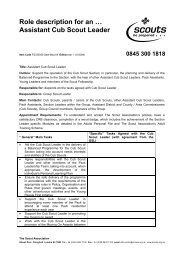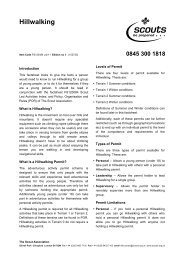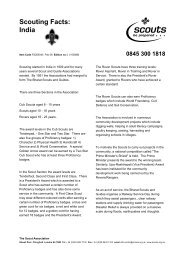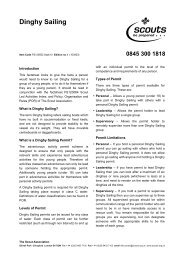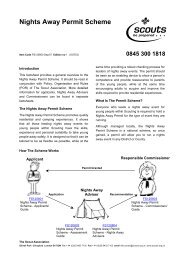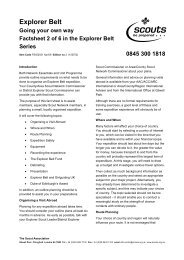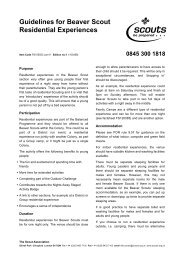Explorer Scout Structures - ScoutBase UK
Explorer Scout Structures - ScoutBase UK
Explorer Scout Structures - ScoutBase UK
Create successful ePaper yourself
Turn your PDF publications into a flip-book with our unique Google optimized e-Paper software.
<strong>Explorer</strong> <strong>Scout</strong> <strong>Structures</strong>SItem Code FS452010 October 2010 Edition no 5 (103559) 0845 300 1818MembershipWhile there are several different ways that ayoung person can become an <strong>Explorer</strong> <strong>Scout</strong>,a number of basic rules apply to them all:• All members of the Movementbetween the ages of 14 and 18 will bemembers of the <strong>Explorer</strong> <strong>Scout</strong>Section.• While there is flexibility to allow youngpeople to move into <strong>Explorer</strong> <strong>Scout</strong>sat the right time for them, between13½ and 14½ years of age, it isimportant to remember that the coreage range for the section is 14 – 18.• All <strong>Explorer</strong> <strong>Scout</strong>s will belong to an<strong>Explorer</strong> <strong>Scout</strong> Unit.• Some <strong>Explorer</strong> <strong>Scout</strong>s may choose tobelong to more than one Unit• Although the <strong>Explorer</strong> <strong>Scout</strong> Unit willbe leader led, young people should beinvolved in decision making as muchas possible. (<strong>Explorer</strong> <strong>Scout</strong>s –Taking the Lead is a resourceavailable to support this area).Types of UnitThere are a number of different types of<strong>Explorer</strong> <strong>Scout</strong> Units. These vary dependingon local needs, resources and othercircumstances:• There can be any number of Units in aDistrict, depending on need.• Units may be set up in partnershipwith one or more <strong>Scout</strong> Groups.These Units will need to negotiate apartnership agreement to establishlinks between the two. For example,use of equipment and meeting place,mutual support and communicationetc.• Other Units may be established inpartnership with specialist <strong>Scout</strong>ingbodies e.g. Water activity centres,Campsites or Gang Shows.• Each District must also establish aYoung Leader Unit. A District mayneed more than one such Unitdepending on size. Small Districts canwork together and establish acombined Young Leader Unit betweenthem.A District will have a combination of thesedifferent types of Units, and the District<strong>Explorer</strong> <strong>Scout</strong> Commissioner (DESC) andDistrict Commissioner (DC) may change theUnits being operated as the needs of theDistrict alter, e.g. establishing, merging orclosing Units. The membership of all Units isopen to all <strong>Explorer</strong> <strong>Scout</strong>s in the District.District RoleThe <strong>Scout</strong> District has the key role in thesuccessful establishment and running of the<strong>Explorer</strong> <strong>Scout</strong> Section:The District has operationalresponsibility for <strong>Explorer</strong> <strong>Scout</strong>ing.• The District is responsible for ensuringthat every young person has theopportunity to take advantage of<strong>Explorer</strong> <strong>Scout</strong>ing.• All <strong>Explorer</strong> <strong>Scout</strong>s will be registeredwith the District. This will helpencourage effective communications.• The District will hold a centraldatabase of all <strong>Explorer</strong> <strong>Scout</strong>s (andThe <strong>Scout</strong> AssociationGilwell Park Chingford London E4 7QW Tel + 44 (0)20 8433 7100 Fax + 44 (0)20 8433 7103 email info.centre@scouts.org.uk www.scouts.org.uk
page 2 of 313+ year old <strong>Scout</strong>s) to ensureeffective communications with all ofthe members in the Section.• <strong>Scout</strong> Leaders should notify theDistrict <strong>Explorer</strong> <strong>Scout</strong> Administrator(DESA) of <strong>Scout</strong>s as they reach 13years of age.• The DESA should send an informationpack to these <strong>Scout</strong>s on their 13thbirthday informing them of theopportunities available in <strong>Explorer</strong><strong>Scout</strong>ing in the District.• During their time in <strong>Explorer</strong> <strong>Scout</strong>s,every individual will receive directcommunications by e-mail or postfrom the District. These will keep themup to date with what is happening intheir home district and whatopportunities and activities they cantake advantage of.• The District must ensure that abalanced programme of activities isavailable to every <strong>Explorer</strong> <strong>Scout</strong>. AllProgramme Zones should be coveredin each year.• The DC, on the advice of the DESCand District Executive Committee isresponsible for the creation,placement and closure of Units withinthe District. This will be done inconsultation with GSL‟s and theDistrict <strong>Explorer</strong> <strong>Scout</strong> Committee.Districts should therefore adopt aflexible approach to the structure,taking into consideration localgeography, numbers, location ofpotential members and needs of local<strong>Scout</strong> Groups.• The District <strong>Scout</strong> Council willundertake the role of the GroupCouncil for all <strong>Explorer</strong> <strong>Scout</strong> Units.This will include undertaking all therequirements of the CharitiesCommission.Partnership Agreements• A Partnership Agreement formalisesarrangements for areas such as finances, useof equipment or meeting place and linkingarrangements between a Unit and a Groupthat it is partnered with. This topic is thesubject of three factsheets which areavailable from the Information Centre atGilwell Park.District <strong>Explorer</strong> <strong>Scout</strong> MeetingThis should be a really important event in the<strong>Explorer</strong> <strong>Scout</strong> calendar for every district.What is it for?• To bring together everyone involved in<strong>Explorer</strong> <strong>Scout</strong>ing in the district inorder to celebrate the past year• To give the <strong>Explorer</strong>s a taster of someof the exciting things to come in thenext year.It will usually be an annual event - either atthe end of one „<strong>Scout</strong>ing year‟ or at thebeginning of the next.Why not turn it into a really special occasion?It could be part of a bigger activity, or a standaloneevent. You could use it to presentAwards or to thank leaders or young peoplefor their hard work.Most importantly it should be fun and acelebration of <strong>Explorer</strong> <strong>Scout</strong>ing.District <strong>Explorer</strong> <strong>Scout</strong> ForumThe District <strong>Explorer</strong> <strong>Scout</strong> Forum meets asoften as necessary.Who should attend?• <strong>Explorer</strong> <strong>Scout</strong>s representing everyUnit in the District – don‟t forget thatthis includes the Young Leaders‟ Unit.<strong>Explorer</strong>s should outnumber leaders.• Leaders from each Unit (including theESL (YL)) should also attend.• The DESC. They are responsible forsetting up the forum and conveningmeetings.The Forum will review the provision of<strong>Explorer</strong> <strong>Scout</strong>ing across the District regularlyto ensure that it is meeting the needs of theyoung people in the area.The Unit ForumEvery <strong>Explorer</strong> <strong>Scout</strong> Unit should establish aUnit Forum. How this is done depends on theindividual Unit, but its main functions arealways the same:
page 3 of 3• to make sure the Unit programme isbalanced• to make sure that the <strong>Explorer</strong> <strong>Scout</strong>shave a big say in what theirprogramme contains.• It is recommended that a YoungLeader should not work in the Troopthat they have just left for at least sixmonths.Some Units will decide to make this a“representative forum” – a small group of<strong>Explorer</strong>s appointed or elected by the rest ofthe Unit whilst others will decide to includethe whole Unit in their forum, when everyonecan have a say about the Unit and itsprogramme.It is the responsibility of the leaders to makesure the programme happens, but if some ofthe <strong>Explorer</strong> <strong>Scout</strong>s want to help organiseand run things, that‟s great! Remember togive them whatever support they need – don‟texpect them to think of everything you takefor granted (like cost, risk assessment, andso on) without training and prompting.The Young Leader’s Unit• Most Young Leaders are <strong>Explorer</strong><strong>Scout</strong>s; they simply have chosen the„activity‟ of being a Young Leader aspart of their <strong>Scout</strong>ing.• Young Leaders may elect to bemembers of other <strong>Explorer</strong> <strong>Scout</strong>Units.• Any <strong>Explorer</strong> <strong>Scout</strong> carrying out aleadership role in a Beaver Colony,Cub Pack or <strong>Scout</strong> Troop must bepart of the Young Leader‟s Unit.• Young Leaders will be givenopportunities to participate in other<strong>Explorer</strong> <strong>Scout</strong> activities and shouldbe able to take part in all elements ofthe Balanced Programme.• They will have opportunities to gain allof the Awards available in the<strong>Explorer</strong> <strong>Scout</strong> Section.• The Young Leader must completeModule A of the Young LeaderScheme within three months ofregistering as a Young Leader.• It is recommended that no more thanthree Young Leaders should work inany Section at any one time. This isflexible depending on the numbers inthe section.


